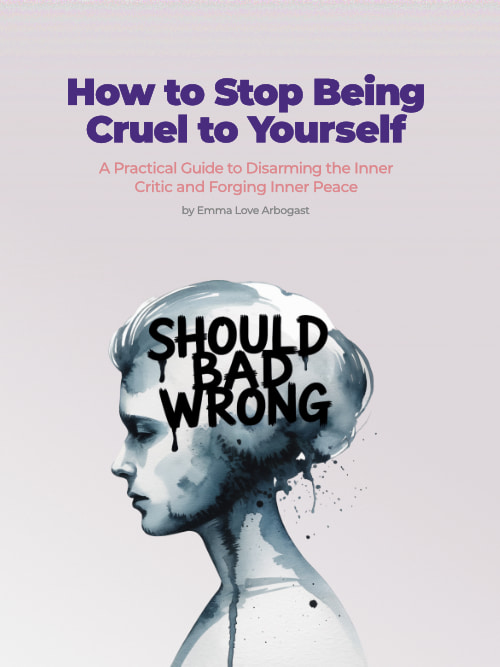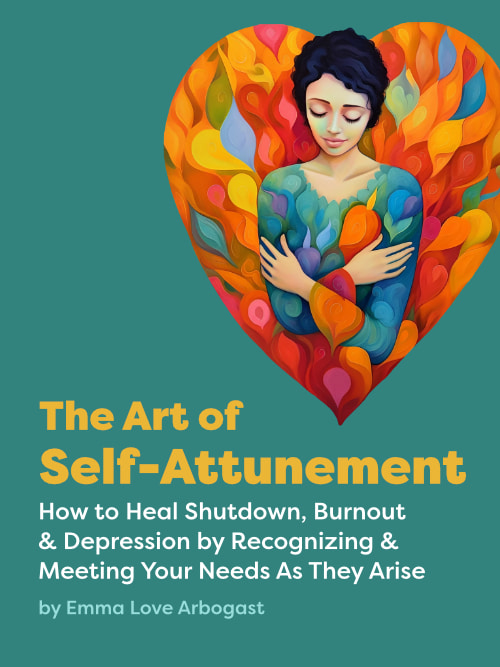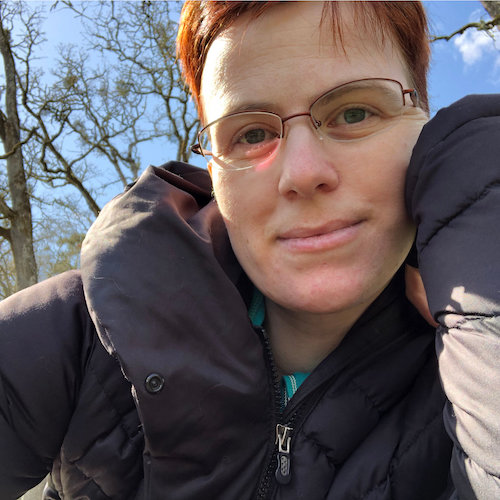What Helped Me Reconcile Logic and Rationality with Magic and Mysticism
I grew up with an atheist, scientific, rationalist worldview. But I was always a magical child, and it didn’t take long after leaving home that I was buying Tarot decks and trying to figure out my natal chart.
But it took me a very long time to reconcile my magical side with my upbringing. I was internally split, always on the fence about what was “real”, and always afraid of the kind of withering judgement that atheists reserve for astrologers and psychics.
I kept asking myself:
- what really is the nature of reality?
- how could astrology possibly be true?
- what if people think I’m gullible and dumb? what if I am?
- am I delusional? imagining things?
- will I lose my grip on reality if I go down this path?
- what if I start believing in aliens and conspiracies? where is the line?
- what if I just want it to be true? am I just reinforcing my own biases or seeing what I want to see?
- am I just trying to escape real life and live in a fantasy?
These doubts and fears kept me from going beyond dabbling in astrology until early 2024. But I finally resolved it, and have been immersed in studying it ever since.
If you find yourself in a similar place, I want to give you a few pieces of information that helped reframe things for me and allowed me to reconcile being an intelligent thinking person with using astrology and Tarot on a daily basis.
We were lied to about the origin of “Western” thought.
I was taught that Socrates and Plato and Aristotle were all about the pursuit of reason and logic and empirical observation, and the Enlightenment thinkers rediscovered their ideas and brought Europe out of the Dark Ages.
This is just not true. It is a story the Enlightenment told about the Greeks to make themselves sound like the inheritors of a tradition rather than the inventors of one.
Eighteenth-century thinkers became obsessed with reason as the only legitimate path to knowledge. To support this, they cherry-picked the bits of Greek philosophy that they could frame as early science, and ignored the rest. The ecstatic, magical side of Greek thought and culture was devalued and eventually forgotten.
Thinkers like Pythagoras and Plato were mystics who saw the cosmos as a divine creation with inherent purpose. Pythagoras led a mystical brotherhood and saw numbers as living symbols of divine harmony. In his writings, Plato described mania—a form of divine inspiration. They also had a version of reincarnation (transmigration of the soul) that has been almost entirely forgotten outside of esoteric circles.
They believed true knowledge came from blending logic with ecstatic insight. They would never have endorsed the idea that everything that is legitimate and real can be derived through rational thought.
The boundary between astronomy, mathematics, and astrology was porous; understanding the movement of the stars was the same as understanding the divine order of the cosmos. Plato gave planets and stars a divine ontological status, portraying them as living, intelligent beings.
So our actual Western tradition is one of a cosmos infused with meaning, where the movements of the heavens mirror the patterns of life on Earth.
The mechanistic worldview and the emphasis on reason is not Greek. Enlightenment thinkers simply projected their priorities onto Greek philosophy. They created a narrative of continuity, positioning themselves as heirs to a “rational” Greek tradition which they had extricated from its actual mystical and polytheistic context.
They were not respectful of the traditions they claimed to admire—they just exploited them to claim legitimacy. It was cultural appropriation, not cultural inheritance.
Learning this was a revelation for me. If the Greeks themselves didn’t see logic and mysticism as enemies, then the whole idea that intelligence requires rejecting the mystical had no foundation. It was just gatekeeping truth.
Scientific materialism is intimately tied to colonialism.
Colonialism is the practice of domination, control, and exploitation of one country or people by another. Colonialism was systematized by Enlightenment ideologies of progress and reason. Their hierarchical assumptions and their material effects are now embedded in every facet of our global system and are woven into dominant culture.
Western scientific materialism is the underlying worldview that supports this dehumanization and exploitation. A mechanistic worldview—seeing nature as a machine—posits disconnection and meaningless as the fabric of our existence. This implicitly grants moral permission to exploit others in the name of “progress”. That exploitation is then internalized as self-exploitation, i.e. internalized capitalism.
The Enlightenment project legitimized the colonialism and capitalism that has destroyed our environment and disconnected us from our bodies and our hearts and each other. But perhaps less obviously, it has also disconnected us from our inherent spiritual awareness. It has devalued subjective experience as a source of truth—but subjective experience is the only way we have to personally experience the Divine. Outside of that experience, God is just an idea.
The rationalist paradigm redefined which ways of knowing are legitimate. It elevated logic and rationality and devalued everything else—art, spirit, connection, community, wellness, joy, play, rest, feeling. Each now has to be justified rationally and logically before we are allowed to engage in it.
Scientific materialism isn’t neutral. It’s a value system masquerading as objectivity, one that arose in a particular historical moment and serves a particular set of power structures. It is not the inevitable or only way to understand the world or to pursue truth.
Given how much damage this value system has done to humanity, I don’t want any part of it. Reclaiming mystical ways of knowing isn’t just personal healing—it’s part of undoing a cultural wound that we are all suffering from.
The pre-modern worldview can liberate us from oppressive normativity.
Normativity refers to the concept of how things ought to be, rather than how they are. Every society has norms, but modernity legitimizes it’s norms through the assumed authority of “science”.
Studying astrology has been liberatory for me, because it is a pre-Christian, pre-modern worldview. It is not structured like modern psychology. It does not divide people into categories of “ordered” and “disordered”.
When you are born, your natal chart reflects a moment in time, but it’s not better or worse than any other moment in time. It’s just your moment, your chart. It reflects what you have to deal with in your life, but it doesn’t judge you.
You are never meant to be anything but what you are, and who you are is fine. That is so different than the modern sense of always striving to be better—to contort yourself into a different, more acceptable shape. Compared to the dominant cultural worldview, it is a huge relief.
I am categorically an outsider in so many ways, and astrology gives me language for my experience of being human that I haven’t found anywhere else. If I was more validated by mainstream categories of experience, maybe I wouldn’t be as interested in it—but I’m not.
So when I read that people with Neptune prominent in their chart often are more physically and emotionally sensitive, feel different and strange and alien, end up playing the martyr/rescuer role in relationships, long to “go home” to a better place that is not Earth, are more susceptible to magical thinking and self-delusion, and can have a frustratingly vague relationship with ambition and taking action—that is validating. It is affirming without being pathologizing. These are all things I need to work with in my life, but that doesn’t make me bad or broken—it just makes me a Neptunian person with Neptunian problems. (If you resonate with this, I have a free Neptune Lessons report on my astro site.)
Astrology is an amazingly precise mirror of our experiences. It is a psycho-spiritual system that has stood the test of time. It now has embedded in it the wisdom of a dozen different cultures and time periods. It is decentralized, flexible, adaptable, and has a depth and breadth of scholarship within it that most people have no idea exists.
I’m not trying to sell you on astrology. What I’m trying to say is, if it works for you and you get benefit from using it, it is perfectly valid to do so. If it’s not for you, that’s fine too! But we don’t have to believe there is anything wrong with deriving value from something that millions of humans across two millennia have used to understand themselves and their place in the cosmos.
Spirituality can be about experience, not belief.
When people ask if I believe in God, I reply that I experience God.
Christianity is particularly obsessed with the question of whether you are believing the right thing or not. I think this has skewed our perception of what spirituality is for.
You can have spiritual experiences without ever settling on a firm belief about the exact nature of what you are experiencing. Belief is not actually required.
I have a lot of working theories based on different spiritual systems that make sense of my experience—but I don’t have a cohesive dogma that I “believe in” to the exclusion of other ideas.
The way I do spirituality is far more about how I want to experience life and how I want to relate to myself. I’m curious and open and happy to let my life unfold every day without needing to know exactly where it is going and what it all means.
I sense there is a purpose and meaning and underlying order to the Universe, and that I am part of it and have a place in it—and I don’t need to have a permanent label for that feeling. I can read what other people have called it and learn from their experiences and even use their language when it is useful, without adopting a set of beliefs. Lots of ideas and practices are fascinating to study and think about and experiment with. I just let myself be into what I am into when I am into it. Maximum permission.
I know what feels true to me, but I also think that whatever is on the other side isn’t something we can truly understand from within the mortal experience anyway. Divination is interpretive art, not scientific measurement. The goal for me is not to prove something or be “correct”—the goal is to grow as a person and enjoy my life.
Astrology was originally a spiritual practice, not a fortune cookie or a personality test.
People have always used divination to try to avoid bad outcomes or increase good outcomes, but ultimately it was meant for more than that. Astrology was part of a mystical practice that trained you to eventually see through the endless cycles of life and the impermanence of forms and glimpse the divine order beyond them.
Astrology was originally oracular, divinatory, and magical—not pseudoscientific. The making of it into a pseudoscience came later as part of removing the “magic” aspect from it (like they did with all of ancient Greek thought). That inevitably led to it being “disproven”—but it wasn’t meant to be about causality in the first place.
It was meant to be a way to read omens in nature and to interact with the Divine. It was meant to be more like Tarot, not physics.
When I realized this, it softened my brain’s insistence that it had to make sense logically or be scientifically provable. It doesn’t and it’s not. Things like retrogrades are symbolic—the planets don’t actually move backwards. Everything in astrology is based on the apparent motion of planets as viewed from Earth to the naked eye. It is geocentric, whereas we know the actual solar system is heliocentric.
But it doesn’t matter. When my grandma died, and the next day I was at a park and I saw a deer and I felt something in the way it looked at me, I didn’t need to prove anything about that experience. When I smudge my house, my energy feels clearer, and that’s why I do it—I don’t know what is literally happening on a physical level. I don’t need to know that any more than I need to know what is neurochemically happening in my brain before I believe I am in love with someone—I know it because I feel it.
The confusion and doubt will resolve over time.
It took about eight months of committed study of astrology before I really felt comfortable with my relationship to it and stopped worrying about if it was “true”. It had just become part of my symbolic vocabulary—a natural way I made sense of the world. I’d also seen it be useful over and over again, and that repeated usefulness mattered more than proving anything.
That’s also when it sunk in just how helpful it had been to immerse myself in a completely different way of seeing the cosmos and human nature than the modern worldview.
So wherever you are at with it, give yourself permission and give yourself time. Explore what you feel called to explore, and embrace the experiences you have. There are no right answers or goals to achieve. Allow yourself the freedom to discover what works for you. 💚
Self-love is a set of skills you can learn

Stop Being Cruel to Yourself
$2.99


Hey there! If you're new here, welcome to the Emmaverse! 🌈✨
About me: I'm autistic/ADHD and I write about how to be free and happy from the inside out.
Keep in touch?
Self-Liberation Society

